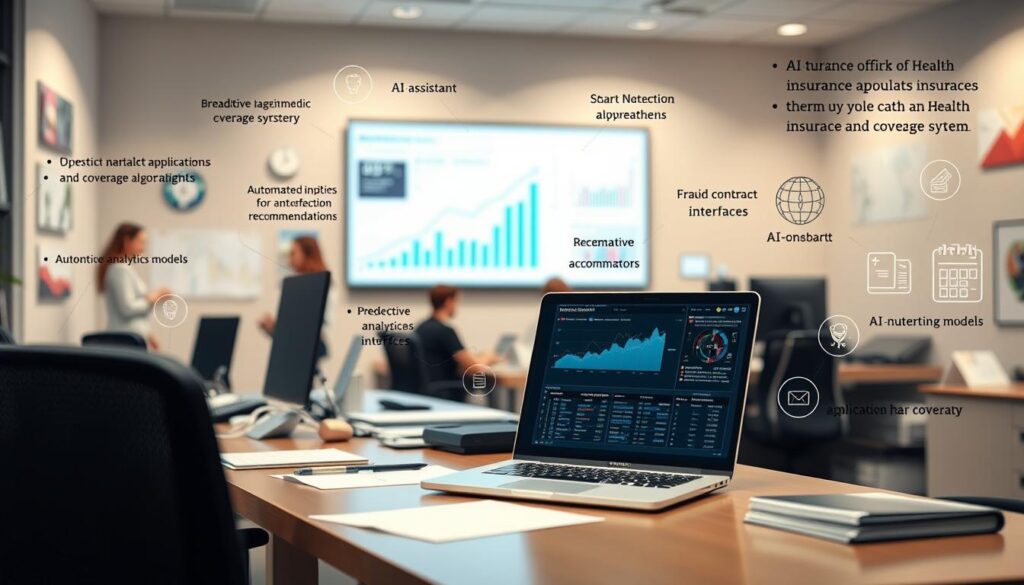In today’s evolving landscape, artificial intelligence is significantly influencing health insurance coverage choices. As insurers increasingly incorporate AI technology in insurance, they are revolutionizing their approach to risk assessment, policy development, and customer engagement. By utilizing sophisticated algorithms and data analysis, leading organizations are enhancing customer satisfaction and streamlining operations. The integration of AI not only improves the industry’s efficiency but also provides individuals with tailored coverage options that meet their unique needs.
Key Takeaways
- Artificial intelligence is transforming decision-making in health insurance.
- Insurers use AI to assess risks more accurately.
- Personalized coverage choices are becoming increasingly accessible.
- AI technology is enhancing customer engagement and satisfaction.
- Leading organizations are leveraging AI for operational efficiency.
The Evolution of Health Insurance in the Age of AI
The evolution of health insurance reflects a complex journey from traditional models to contemporary solutions driven by technology. In earlier times, health insurance primarily focused on basic coverage with limited personalization. As consumer needs grew more diverse, these outdated models struggled to keep pace, leading to gaps in service and satisfaction.
The impact of AI has been transformative, reshaping the landscape of health insurance. By harnessing advanced algorithms and data analytics, insurers can now tailor their offerings to the specific needs of individuals. This has greatly enhanced personalization, allowing customers to find plans that truly meet their healthcare requirements, a significant shift in the ongoing insurance transformation.
AI enables insurers to analyze vast amounts of data efficiently, providing insights into consumer preferences and trends. This capability supports a more dynamic response to regulatory changes and competitive pressures, helping insurers adapt their products in real-time. The integration of sophisticated AI applications has turned challenges into opportunities, fostering innovation within the industry.
The continuous evolution of health insurance, complemented by AI advances, represents a major leap forward. Insurers are now positioned to offer not only more efficient services but also to empower clients in making informed choices regarding their health coverage.

Understanding the Basics of Health Insurance Coverage
Understanding health insurance basics can empower individuals to make informed decisions regarding their health coverage. This knowledge encompasses various types of policies, key terms, and essential features that are pivotal in selecting the right plan. Familiarity with premiums, deductibles, and copayments is crucial for assessing coverage options.
Health insurance policies typically include several components. A premium is the amount paid monthly to maintain coverage, while a deductible refers to the amount an individual must pay out-of-pocket before the insurance kicks in. Copayments are fixed fees for services like doctor visits or prescriptions, making it essential to understand how these interact with overall policy features.

Another significant aspect involves network considerations. Policies may have in-network providers, offering lower costs for services, compared to out-of-network providers. Recognizing these distinctions helps in evaluating coverage options, ensuring consumers select a plan that aligns with their healthcare needs.
| Policy Feature | Description |
|---|---|
| Premium | Monthly payment to keep the insurance active. |
| Deductible | Amount payable before insurance coverage begins. |
| Copayment | Fixed fee for specific healthcare services. |
| Network | Group of healthcare providers within the plan. |
Arming oneself with this foundational knowledge allows for better navigation of the health insurance landscape, enhancing the ability to utilize emerging technologies like AI for smarter decision-making. Understanding these policy features ultimately leads to more tailored and suitable health coverage options for individuals and families alike.
How Artificial Intelligence Controls Your Health Insurance Coverage
Artificial intelligence plays a pivotal role in the realm of health insurance, influencing how coverage choices are managed. Through AI control in health insurance, automated decision-making processes streamline eligibility assessments and premium calculations. This technology allows insurers to utilize vast datasets for analysis, enhancing the speed and accuracy of decisions.
One of the significant benefits of AI lies in its capability for dynamic policy adjustment. Insurers can make real-time modifications to policies, ensuring that they continue to meet the needs of individuals as circumstances change. For example, if a person’s health status shifts, AI systems can quickly recalibrate coverage options and premiums accordingly.
Furthermore, insights derived from AI-driven analytics significantly reduce the chances of claim denials. This improvement leads to a more positive experience for consumers, who benefit from enhanced customer service interactions. Companies that leverage AI are better positioned to assist their clients with timely responses and tailored solutions, enhancing overall satisfaction.
| Aspect | Traditional Method | AI-Powered Method |
|---|---|---|
| Eligibility Assessment | Manual review of applications | Automated analysis using data algorithms |
| Premium Calculation | Standardized pricing models | Dynamic pricing based on user data |
| Policy Adjustments | Annual reviews | Real-time updates based on data |
| Claim Processing | Time-consuming manual process | Instant validation with AI tools |

The Benefits of AI in Health Insurance Decision-Making
Artificial Intelligence (AI) offers numerous advantages in health insurance decision-making that can significantly impact both insurers and consumers. Key areas of focus include enhanced risk assessment and innovative personalized coverage options, which contribute to improved policies and greater customer satisfaction.
Improved Risk Assessment
AI benefits in risk assessment are profound. Insurers leverage AI algorithms to analyze extensive historical data, which allows them to identify risk factors with high precision. This capability of predicting future claims results in more accurate premium pricing and reduces financial loss for companies. The refinement of risk assessment processes leads not only to healthier risk pools but also ensures consumers receive fair pricing based on their unique health profiles.
Personalized Coverage Options
In the realm of personalized insurance, AI plays a pivotal role in designing bespoke insurance packages tailored to individual needs. By examining a consumer’s health data, preferences, and financial circumstances, insurers can create plans that offer precisely what is necessary for each client. This level of customization enhances customer satisfaction and fosters a stronger relationship between insurers and clients, ultimately transforming the health insurance landscape.

AI Tools Transforming Health Insurance Applications
The landscape of health insurance is undergoing a significant transformation, driven by cutting-edge AI tools in insurance. These innovations are reshaping how customers interact with their providers and enhancing decision-making processes within the industry.
Chatbots and Virtual Assistants
Chatbots and virtual assistants play a pivotal role in streamlining customer service for health insurance applications. These AI-driven tools provide immediate responses to inquiries and assist users with various tasks, such as policy inquiries and claims processing. The implementation of these virtual assistants has greatly improved the efficiency of customer interactions. Policyholders benefit from quick access to information and guidance, which diminishes the need for prolonged hold times or extensive phone calls and elevates customer satisfaction.
Data Analytics and Predictive Modeling
The usage of data analytics and predictive modeling within health insurance applications enhances operational efficiencies. Insurers leverage predictive analytics to forecast trends and understand consumer behavior. By analyzing large amounts of data, companies can optimize resource allocation and tailor services that meet customers’ needs more effectively. This approach contributes to better risk assessment and personalized offerings, further solidifying the importance of AI tools in insurance.
| Feature | Chatbots & Virtual Assistants | Data Analytics & Predictive Modeling |
|---|---|---|
| Functionality | Immediate customer support | Trend forecasting |
| Efficiency | Reduces customer wait times | Optimizes resource allocation |
| Customer Experience | Enhances interaction quality | Personalizes coverage options |
| Scalability | Handles multiple inquiries simultaneously | Processes large data sets |

The Challenges of Implementing AI in Health Insurance
The integration of artificial intelligence in health insurance aims to enhance operations and decision-making processes. Yet, it faces significant hurdles that must be addressed to ensure a successful transition. Key issues include data privacy and the complex landscape of insurance regulations.
Data Privacy and Security Concerns
As insurers incorporate AI systems, the protection of sensitive consumer information emerges as a top priority. Data privacy is vital, as breaches can lead to severe consequences for both insurers and their clients. Insurers must employ robust security measures to safeguard personal health information. Balancing innovation with privacy laws challenges many organizations, necessitating ongoing vigilance to build consumer trust.
Regulatory and Compliance Issues
Navigating the intricate web of insurance regulations is another significant challenge. Insurers face AI implementation challenges when attempting to comply with various federal and state laws governing data usage and consumer protection. Constant changes in legislation require ongoing adaptations. Achieving compliance without stifling innovation remains a delicate balancing act that insurers must master to thrive in a rapidly evolving market.

The Future of AI in Health Insurance Coverage
The future of AI in insurance promises to reshape health coverage significantly. With rapid technological advancements, insurers are likely to leverage new tools and techniques that enhance customer engagement. Enhanced customer interaction platforms will allow for smoother communications, providing clients with real-time assistance and guidance in navigating complex insurance options.
In parallel, evolving coverage solutions will emerge, adapting to individual needs and preferences. Predictive analytics is expected to become more sophisticated, enabling insurers to anticipate customer behavior and tailor offerings accordingly. This adaptability not only improves customer experience but also increases retention rates as clients feel more understood and valued.
Furthermore, the ongoing development of AI technologies will likely streamline processes, reducing overheads and eliminating inefficiencies. Companies that invest in these innovations position themselves ahead in a competitive market. As AI continues to evolve, the integration of smart algorithms into health insurance will not just enhance operational frameworks but also drive fundamental changes in how policies are developed and administered.

Real-World Examples of AI in Health Insurance
The integration of AI technology into health insurance is transforming the industry by enhancing customer experience and streamlining operations. Numerous companies are demonstrating the potential of AI through innovative applications and effective strategies. These real-world applications not only illustrate the benefits of AI but also emphasize how it shapes the future of health coverage.
Case Studies from Leading Health Insurers
Several established insurers have successfully implemented AI solutions to improve their services. Notable examples include:
- Anthem employs AI-driven analytics to enhance claim processing speed and accuracy, minimizing the time customers wait for approvals.
- UnitedHealth Group utilizes machine learning algorithms to predict patient healthcare needs, guiding personalized treatment recommendations and optimizing resource allocation.
- Allianz applies natural language processing to chatbots, allowing 24/7 customer support, resulting in a higher satisfaction rate among members.
Innovative Startups Utilizing AI Technology
In addition to established insurers, health insurance startups are leveraging AI to disrupt traditional business models. Their approaches provide fresh perspectives on old challenges, including:
- Lemonade uses AI-driven underwriting processes that allow for instant quote generation and policy issuance, significantly reducing the onboarding time for new clients.
- Oscar Health employs predictive analytics to inform users about the best healthcare providers and services tailored to their individual health profiles.
- Bright Health focuses on a tech-driven model where AI streamlines care coordination and communication between patients and providers, enhancing overall patient engagement.

Conclusion
In summary of AI in health insurance, we’ve explored how artificial intelligence is reshaping decision-making processes, enhancing personalization for consumers, and streamlining operational frameworks within the industry. The transformative power of AI not only creates smarter insurance options but also equips consumers with the tools necessary for informed choices.
The key takeaways highlight the incredible benefits AI technology brings to the health insurance landscape, from predictive analytics that refine risk assessments to virtual assistants that improve customer interactions. As the industry continues to evolve, it’s essential for stakeholders to embrace these advancements and leverage them for a more efficient and responsive system.
Looking toward the future outlook, ongoing innovation in AI is vital for sustaining the momentum of these improvements. Consumers are encouraged to stay informed about how emerging technologies can enhance their health insurance experiences, ensuring they find the best coverage tailored to their unique needs.









